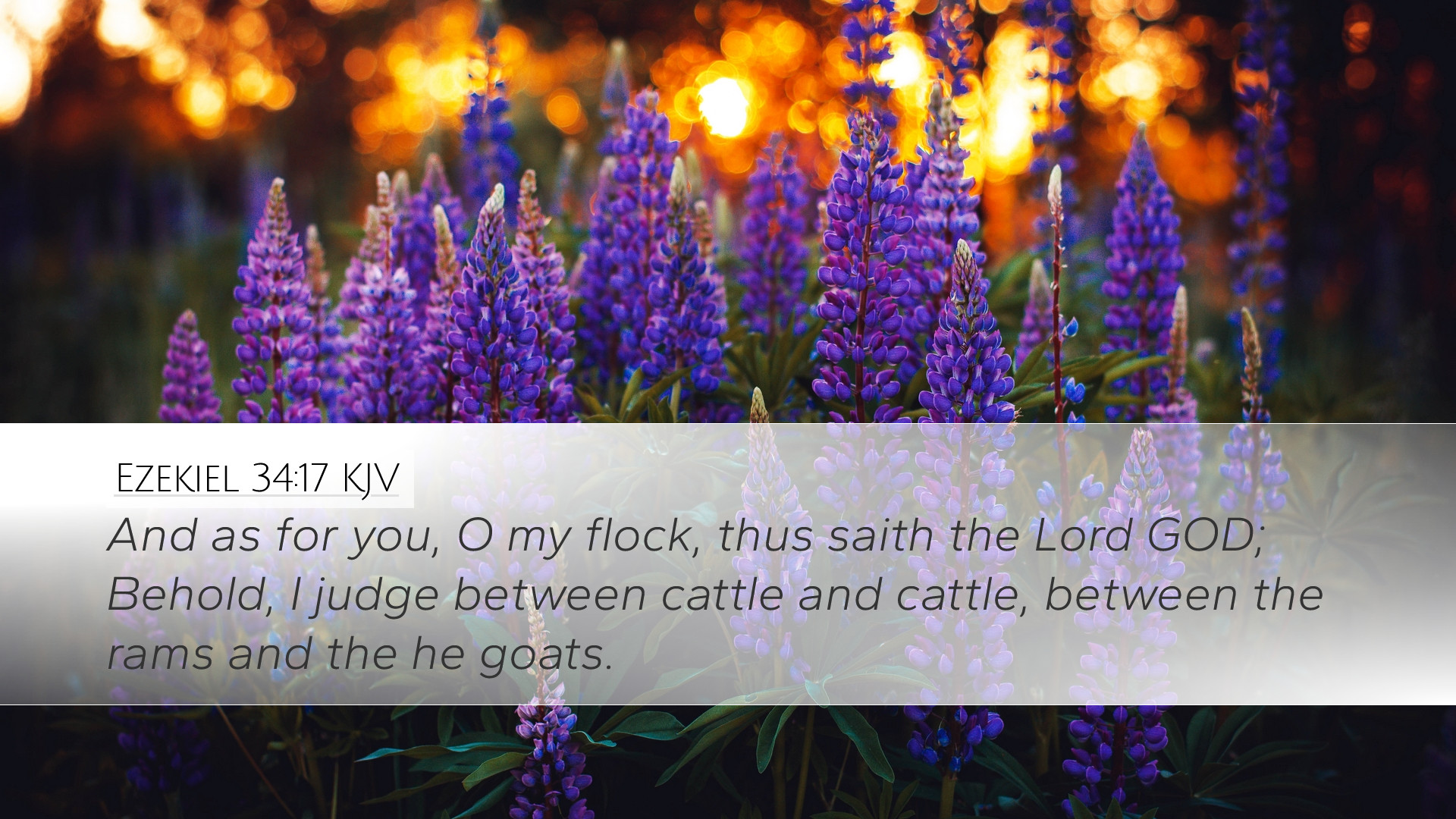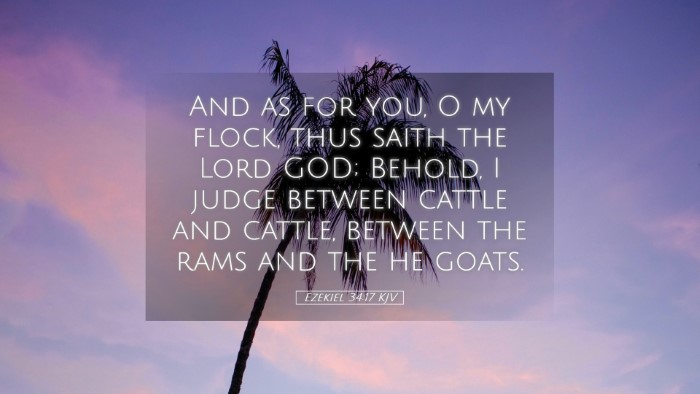Commentary on Ezekiel 34:17
Bible Verse: "As for you, my flock, thus says the Lord God: Behold, I judge between sheep and sheep, between rams and male goats."
Introduction
This verse from the book of Ezekiel serves as a profound reminder of God's pastoral care and His role as the ultimate judge. It indicates a time of separation and judgment among the people of Israel, metaphorically represented as sheep and goats. In this commentary, we will explore the insights from notable public domain commentaries, providing meaningful reflections and applications for pastors, students, theologians, and Bible scholars.
The Context of Ezekiel 34
The context of Ezekiel 34 is critical to understanding the implications of verse 17. The chapter emphasizes God's rebuke of the leaders of Israel, accusing them of failing to care for the sheep, who represent the people of Israel. God pronounces judgment upon these leaders for their negligence and exploitation. The chapter then transitions into a promise of restoration, where God Himself will shepherd His flock.
Matthew Henry’s Commentary
According to Matthew Henry, this verse highlights the justice of God. He notes that the phrase "I judge between sheep and sheep" signifies a discernment that God exercises amongst His people, ensuring that fairness prevails. Henry emphasizes that God's judgment is not arbitrary but is based on the character and actions of individuals within the community.
- Divine Justice: Henry underscores that God's judgment is essential for maintaining the moral order in His flock.
- Accountability Among Believers: He stresses the importance of accountability within the church and encourages leaders to shepherd their flocks diligently.
Albert Barnes’ Commentary
Albert Barnes provides a detailed exposition on the metaphor of "sheep" and "goats," likening them to the righteous and the wicked within the covenant community. Barnes notes that God’s judgment is indicative of His omniscience; He sees beyond outward appearances and unrepentant hearts.
- The Concept of Separation: Barnes highlights that God’s judgment involves a separation that reflects the intrinsic differences between those who follow Him authentically and those who do not.
- Future Accountability: In his view, this judgment foreshadows a greater eschatological judgment, where every individual will be held accountable.
Adam Clarke’s Commentary
Adam Clarke gives a pastoral interpretation of this verse, focusing on God’s role as a shepherd. He argues that the shepherd’s responsibility is to protect, guide, and provide for the flock. Clarke states that God’s judgment serves as a reminder of His ultimate sovereignty and care over His people.
- Encouragement for the Faithful: Clarke highlights that while judgment may seem stern, it ultimately serves to protect the faithful and uphold justice.
- Call to Leadership: He encourages spiritual leaders to reflect God’s heart in their leadership, thus modeling the qualities of a good shepherd.
Theological Implications
Ezekiel 34:17 carries profound theological implications about God's nature as judge and shepherd. Each of the commentators emphasizes different aspects of God's character:
- God’s Justice: The verse illustrates God's commitment to justice within His community, reminding us that He takes sin seriously.
- God's Shepherding Care: God’s desire to care for His flock is evident, reinforcing the idea that He is personally invested in the well-being of His people.
- The Nature of Community: This verse encourages believers to consider their role within the church, recognizing that each member contributes to the health of the whole body.
Application for Today’s Believers
For contemporary believers, Ezekiel 34:17 serves as a timely reminder of several critical truths:
- Personal Accountability: Each individual must examine their heart and actions, understanding that God discerns the true state of one's spiritual life.
- Leadership Responsibilities: Pastors and church leaders are called to lead with integrity, placing the welfare of their congregation at the forefront of their ministry.
- Hope in Judgment: The judgment of God is not solely punitive; it is also restorative, highlighting His desire to cultivate a faithful and righteous community.
Conclusion
Ezekiel 34:17 encapsulates a message of divine justice and pastoral care. Through insights gleaned from public domain commentaries, we understand that God provides a thorough judgment that influences both individual lives and the collective community. For leaders, students, and scholars alike, this verse challenges us to reflect on our own roles within the flock, ensuring that we embody the love and justice of the Good Shepherd.


